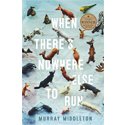 IN BRIEF:
IN BRIEF:
A short story collection which is rich with pathos and sparing with words. As a writer, Murray Middleton is wise beyond his years, and humble beyond his generation.
Details, Details:
Category:Literary fiction
ISBN:9781760112332
Publisher:Allen & Unwin
Pub Date:May 2015
Page Extent:256
Format: short stories
Thoughts:
Google the name ‘Murray Middleton’ and the results will surprise you.
There are a few news articles on his 2015 Vogel win (the prize being $20,000 and publication of When There’s Nowhere Else to Run) and his 2010 win in The Age short story prize.
Apart from that, there’s not much.
No blog. No facebook page. No twitter, instagram and pinterest profile. No articles on writing. Nothing personal.
In this day and age of the ‘author platform’, the lack of such a platform can be almost as telling as the presence of it.
Middleton is one of those writers who wants the work to speak for itself. And it does, as long as you’re listening closely.
His short stories revolve around characters whose choices in life have become unwelcome or non-existent. There is the single mother who cannot cope with her autistic son, the friends who gather at a Victorian weekender to usher one of their own towards death, and the couple at a health retreat trying to re-build their relationship in the aftermath of infidelity.
Their stories are told with subtlety and sparing prose. Middleton can never be accused of over-writing. In these stories, as in life, so much of what is meant is never said explicitly. In this work, the sub-text is as important as the text itself. In Middleton’s world, a reader is a partner. Meanings must be co-constructed. If you’re not willing to try, to think a little, don’t bother.
What Middleton is aiming at is a sense of truth. That much we can glean from one of the stories (seemingly semi-autobiographical) in which a young writer crosses the Nullarbor on the Indian Pacific, courtesy of proceeds from a short story competition.
In the restaurant car, he encounters an elderly critic who tells him that part of the story for which he won the award didn’t quite ring true. The young writer is incensed. ‘He was tapping into one of my greatest fears, namely that the majority of what I wrote would only ever seem like a refined version of the truth. Somehow I wanted it to be more than that.’
Apparently, part of the deal for winning the Vogel, was the Middleton had to sign a non-disclosure agreement, which meant he couldn’t talk about his win for six months. He says it was hard, but I suspect it wasn’t that hard. If his writing is any indication, Middleton is excellent at sitting back and observing. The kind of guy who sits back at a party, takes it all in, and comes out with the killer line, like this one, which appears in ‘The Fields of Early Sorrow’ (the story that won him The Age comp) as a man drives through western NSW to take his sister to a treatment facility.
‘I dare say all happiness is fleeting. It is a great pity the same can’t be said of sorrow.’
Ain’t that the truth.
For more information, visit Allen and Unwin
